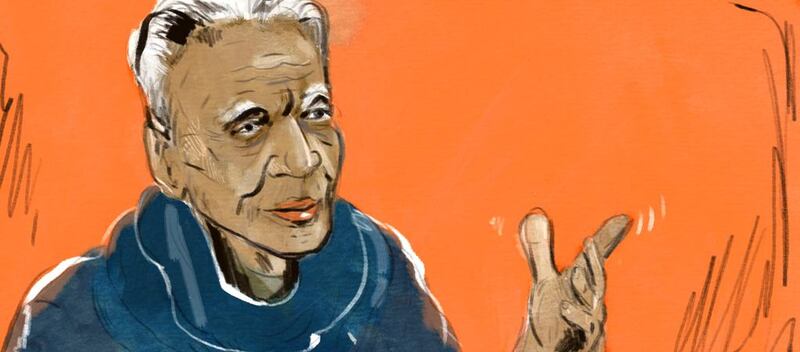Kamal Abdel-Malek
I was deeply saddened by the news of the passing of Ahmad Fouad Nigm, the renowned Egyptian poet who died on December 3 at the age of 84. I met him for the first time in 1989 and his work has been one of the main topics for my academic studies. (I published my first book about him, A Study of the Vernacular Poetry of Ahmad Fuad Nigm and two further books in Arabic.) I kept in contact with him until very recently and still fondly remember my visits with him in his apartment, and how we used to sit on the floor of his roof, chatting about our country while chickens were running and cackling around us.
Nigm’s poetry portrays Egypt as a society with distinct social forces whose interests run counter to one another: the rich versus the poor or what Nigm called the residents of the main streets and those of the alleyways; the villager versus the urban afandi; the native ibn il-balad versus the rulers; the patriot versus the colonialist khawaga. These conflicting forces create a totality that is greater than the sum of its individual parts. The secret behind this seeming paradox is attributed to a hidden factor – or in the words of Lucien Goldmann, a hidden deity – that has to be sought in the “dialectical” relationships between these social forces. Egypt’s common folk are Nigm’s heroes. They are portrayed as simple and unassuming, but they are shown to possess native cunning that has enabled them to survive poverty, political oppression and foreign invasion. Helpless and downtrodden as they may be, they are at the same time patient and restrained and have a sharp sense of humour.
What is remarkable about Nigm’s poetry is the way it appeals to widely diverse segments of society such as students, labourers and intellectuals. What is it in the language and the subjects of these poems that makes them so popular?
One can identify three factors that may account for both the effectiveness and popularity of Nigm’s poetry: it is expressed in the colloquial and put in various folk poetic forms; it is protest poetry full of political and social criticism of society; and it is highly melodious and thus easy to memorise. Throughout the 1970s and 1980s, hundreds of Nigm’s political chansons, sung and recorded on cassette tapes, were surreptitiously making the rounds in Egypt and some of his anti-government lines have since been shouted in demonstrations in Tahrir Square in Cairo and elsewhere.
In a country that suffers from a high rate of illiteracy, it is little wonder that Nigm’s poems are popular. Those who cannot read, can, at least, listen to and understand these poems when they are recited. In this way Nigm’s revolutionary poetry can be potently effective as a protest tool. Perhaps that is the reason why Nigm’s poems have, by and large, been considered subversive by the Egyptian authorities and why Nigm himself was regarded as a provocateur and as a result was in and out of jail.
Furthermore, Nigm’s political chansons with their earthy, Egyptian colloquial Arabic (’ammiyya) and their celebration of folk poetic traditions seem to pose a serious challenge to those scholars and literary critics to whom ’ammiyya works have no place in their canonical definition of “high” literature.
In his own way, Nigm appears to confirm the ’ammiyya as a respectable and effective medium of literary composition. He tried to popularise poetry, making it a common currency for all his countrymen, be they rich or poor, lettered or unlettered.
Ahmad Fouad Nigm lived by his own principles. He was a fearless poet who spoke truth to power. And the truth he spoke was delivered with an impressive combination of force and beauty.
Kamal Abdel-Malek is a writer and academic based in Dubai





